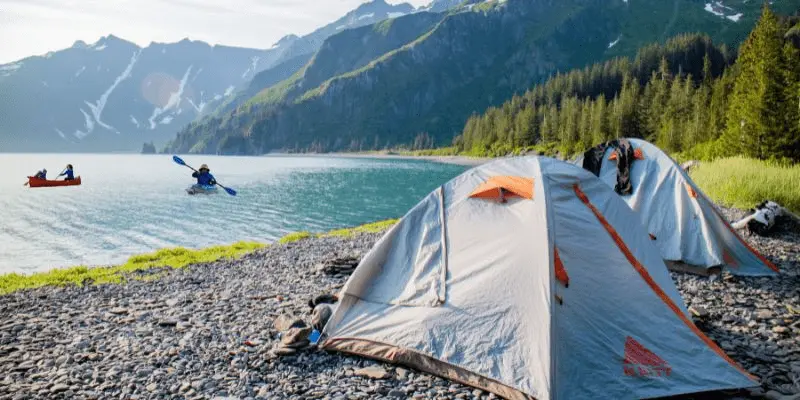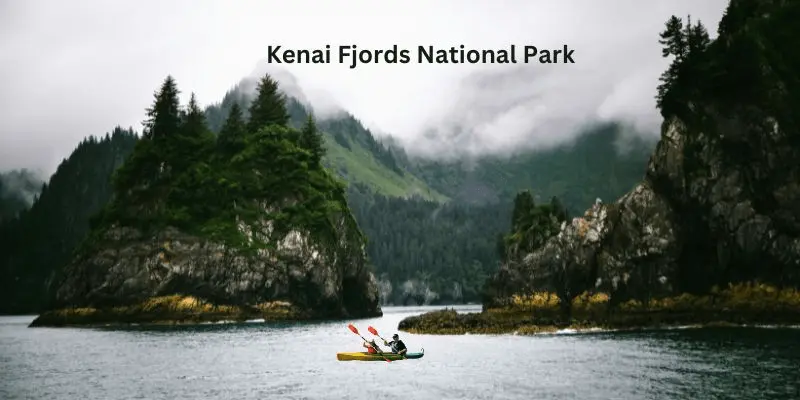Exploring the Best Location for the Camp: 7 Factors to Consider for a Memorable Outdoor Experience
Updated: 19 Jan 2024
305
The possibilities for the best location for camp are endless, so don’t be afraid to try new locations and experiences. With the right preparation and a sense of adventure, you can make any campsite your home away from home. So why wait? Start planning your next camping trip today and experience the beauty of nature firsthand.
Keep exploring, respecting, and preserving our natural world for future generations to enjoy. Let’s continue to appreciate and connect with nature through camping. Remember to follow safety guidelines, be responsible campers, and leave no trace behind.
Whether it’s for relaxation or adventure, camping is the perfect way to disconnect from the hustle and bustle of daily life and reconnect with nature. So, go ahead, make memories around the campfire, explore new trails, and sleep under the stars.
Finding the Best Location for the Camp
No matter whether you are a beginner or an experienced camper, choosing the perfect camp spot can be a challenging task. The right location can make your camping experience enjoyable and memorable, while the wrong one can turn it into a disaster.

To help you find the ideal camping spot for your next adventure, here are some tips to consider:
1. Research and plan ahead
Before heading out, do some research on potential camping locations in the area. Look for reviews and recommendations from other campers to get an idea of what to expect.
2. Consider the terrain
It’s important to choose a flat and even ground for pitching your tent. Avoid areas with steep slopes or rocky surfaces, as they can be uncomfortable to sleep on and may also pose safety hazards.
3. Check for amenities
Depending on your camping style, you may prefer a more rustic or a more developed campsite. Look for amenities such as toilets, water sources, and fire pits if necessary.
4. Be mindful of the surroundings
It’s essential to be considerate of the environment when choosing a campsite. Avoid fragile ecosystems and protected areas, and always follow Leave No Trace principles.
5. Think about the weather
Keep in mind the weather conditions when selecting a campsite. Look for sheltered spots or areas with natural windbreaks to protect your tent and belongings
6. Safety first
Ensure that you are camping in a safe area, away from potential hazards such as flood-prone areas, unstable trees, or steep drop-offs. Also, familiarize yourself with any wildlife that may be present in the area and take necessary precautions.
7. Follow regulations
Some areas require permits for camping, while others have specific rules and restrictions. Make sure to follow these regulations to avoid any issues during your trip.
By considering these factors, you can find a suitable location for camping that meets your needs and ensures a positive outdoor experience
Factors of Finding the Best Location for the Camp
When you have to go camping then it is important to keep in mind the following factors for the best location for the camp so you can enjoy your vacation.
Accessibility
Consider how far the campsite is from your home and if it’s easily accessible by car or foot. This will determine how much time and effort it takes to reach the site.
Scenery
Some campers prefer a picturesque view, while others may prioritize privacy. Think about what type of scenery you would like to wake up to each morning.
Activities
If you have specific activities planned for your camping trip, such as hiking or fishing, choose a location that offers these opportunities nearby.
Group size
The number of people in your camping group can also impact the choice of the campsite. Make sure to select a spot that can comfortably accommodate all members and their equipment.
Seasonal considerations
Some areas may be better for camping during certain seasons due to weather or insect activity. Consider this when choosing a location and plan accordingly.
Personal preferences
Ultimately, the best campsite is one that aligns with your personal preferences and needs. Whether it’s being close to water, having access to amenities, or being in a secluded area, make sure to choose a spot that makes you happy.
Forest Best Camp Location that Meets Your Needs
The perfect forest haven for my campsite whispers promises of adventure and serenity in equal measure.
1. National Parks
With a wide range of amenities and activities, national parks make for great camping spots. They offer well-maintained campsites and stunning natural settings.

2. State Parks
Similar to national parks, state parks provide various amenities and recreational opportunities. They also tend to be less crowded than national parks.
3. Public Land
Depending on the regulations, public lands such as national forests and Bureau of Land Management (BLM) areas can offer free or low-cost camping options. These spots are usually more secluded and provide a true wilderness experience.
4. Private Campgrounds
For those who prefer a more developed campsite with amenities like showers, laundry facilities, and wifi, private campgrounds are a good option. They often offer different types of camping, such as RV sites or cabins.
5. Dispersed Camping
If you’re looking for a more remote and primitive camping experience, dispersed camping on public land is an excellent choice. It allows campers to set up camp in undeveloped areas, typically with no facilities.
No matter where you choose to camp, always remember to leave the site better than you found it. This ensures that the location remains beautiful and enjoyable for future campers to come. Happy camping! By considering all of these factors, you can find the perfect campsite for your next outdoor adventure, whether it’s a weekend getaway or a long-term trip. Remember to always prioritize safety and respect nature while enjoying the great outdoors.
With proper planning and research, you can discover a hidden gem for camping that will create unforgettable memories. Finally, always remember to check the weather forecast before heading out and be prepared with appropriate gear and supplies. Stay safe and have fun.
Pros and Cons of the Best Location for Setting Up Camp
While you setting up the best location for camp, you should remember that there are pros and cons of every location.
| Pros |
|---|
|
| Cons |
|---|
|
Regardless of the pros and cons, it’s important to carefully consider all aspects before choosing a campsite. As long as you prioritize safety and environmental responsibility, any location can be the perfect spot for your next camping adventure. Happy camping!
Additional Tips for Setting up Camp
- Set up camp at least 200 feet away from water sources to avoid contamination and protect wildlife.
- Look for natural features such as trees or rocks that can provide shade and shelter from wind.
- Orient your tent to take advantage of natural light and avoid facing the morning sun if you prefer sleeping in.
- Remember to pack out all the trash and leave the campsite better than you found it.
- If possible, visit the location beforehand to get a better sense of the ground.
Kid’s Best Location for the Camp
- Choose a spot with enough space for kids to run and play safely.
- Look for campsites near hiking trails or nature walks suitable for children.
- Consider selecting a location with access to activities such as stargazing, bird watching, or wildlife spotting.
- Ensure the campsite is away from any potential dangers like water bodies or cliffs.
Additional Tips for Kid’s Best Camping Location
Kid’s safety and enjoyment should always be the top priority when choosing a camping spot. It’s also important to involve them in the decision-making process and let them have a say in which location they prefer. This will make the experience more exciting for them and create lasting memories for the whole family.
Happy camping with your little ones!
So, based on these factors, select a location that suits your needs and preferences. Whether it’s a peaceful retreat in the mountains or a beachside adventure, taking the time to find the perfect campsite will make your camping trip all the more enjoyable. Keep these tips in mind for your next outdoor excursion and have an unforgettable experience surrounded by nature. Enjoying our natural surroundings is one of the greatest pleasures of camping.
Family best location for the camp
- Choose a location that offers both privacy and space for family activities.
- Look for campsites with nearby family-friendly attractions or recreational opportunities.
- Consider selecting a spot near amenities such as showers and playgrounds for children.
Additional Tips for Camp Best location for Family
Camping with the whole family can be a fun and rewarding experience, but it’s essential to consider everyone’s needs. Make sure to choose a location that caters to both adults and children and plan activities that everyone can enjoy together. With the right location and preparations, your family camping trip will be an unforgettable bonding experience.
Happy camping with your loved ones!
So, consider all of these factors when choosing a campsite and create the perfect outdoor getaway for you and your family or friends.
FAQs
Is camping allowed in all areas?
Camping regulations vary depending on the location. Some places may have designated campsites, while others may not allow camping at all. It’s essential to research and follow any rules or restrictions in the area you plan to camp.
How do I know if a campsite is safe?
Before choosing a location, consider the potential hazards such as wildlife, weather conditions, and natural obstacles. It’s also a good idea to check for any camping advisories or warnings in the area.
Can I camp on private property?
Camping on private property requires permission from the owner. It’s important to respect others’ property and follow any rules they may have regarding camping.
Are there any permits or fees required for camping?
In some areas, a permit or fee may be required to camp. It’s important to research and obtain any necessary permits before setting up camp.
How do I find the best campsites in an area?
There are various resources you can use to find the best campsites in an area, such as online camping forums, park websites, and campground directories. You can also ask for recommendations from experienced campers or park rangers.
What should I do if I encounter wildlife while camping?
It’s essential to respect the natural habitat of animals and keep a safe distance from them. Make sure to properly store food and dispose of trash to avoid attracting wildlife to your campsite. If necessary, seek guidance from park rangers on how to handle encounters with wildlife. So, keep these tips in mind. Remember to always prioritize safety and respect for the environment while enjoying your outdoor adventures.
Conclusion
Choosing the Location for the camp is crucial for a successful camping trip. With personal preferences, pros and cons of different locations, and additional tips for specific groups, you can now make an informed decision on where to set up camp. Remember to prioritize safety and environmental responsibility, involve everyone in the decision-making process, and do thorough research before embarking on your next camping adventure.
So, based on these factors and tips, go ahead and plan your perfect outdoor getaway surrounded by nature. Whether it’s a solo trip, a family vacation, or a fun adventure with friends, the right campsite can make all the difference. Keep exploring and enjoying our natural surroundings responsibly.
Please Write Your Comments